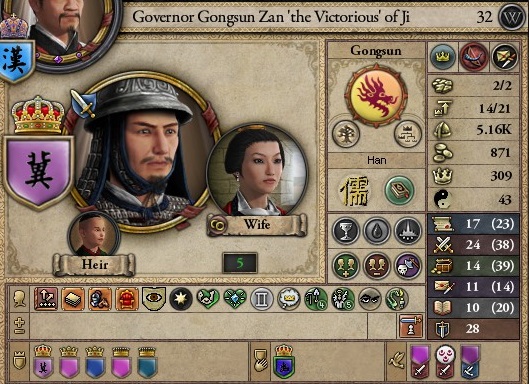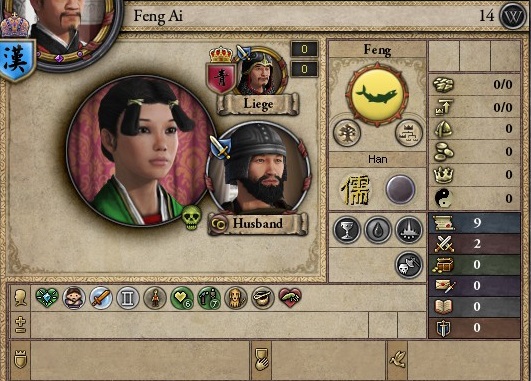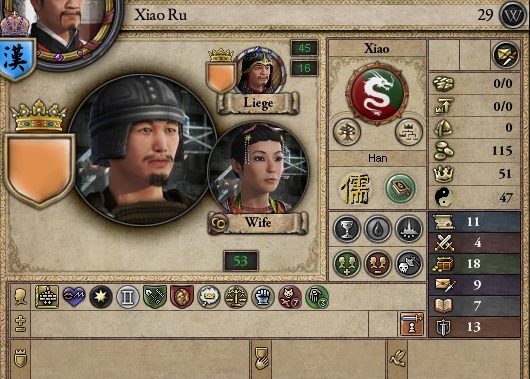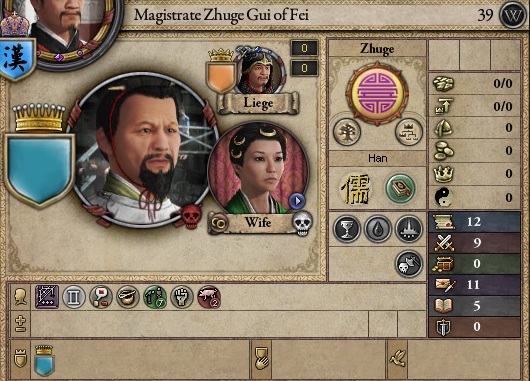QORTEN APPROVED OF THE INTERACTIVE CHARACTER CREATION OF THIS AAR
CHARACTER CREATION CLOSED. NO NEW CHARACTER WILL BE ACCEPTED.
 Hi! And welcome to The Last Days of the Han AAR!
Hi! And welcome to The Last Days of the Han AAR!
So this is my third AAR. The first one ended due to a loss of saves and the second I just finished, although not in the way it started. This third AAR will be mostly written in a history book style, as I simply find it easier to do. I say mostly because I might use a more narrative structure from time to time to focus on specific events or characters.
So the Last Days of the Han will be telling the story of the fall of the Han Dynasty (aka the start of the Three Kingdoms era). I’ve realized that there was no AAR of my favorite mod, The Romance of the Three Kingdoms by @JaceX , and so I decided to rectify this grave sin. This AAR will cover the warlords and rivalries of the era, the Cao Cao’s, the Lü Bus and the Yuan Shaos of the time (all these guys will probably be in the story, by the way). We’ll watch them duke it out, see some of them fall and other rise in the hope of unifying China. At the very least, I’m aiming at reaching the end of China, and with some luck even reach a new status quo (either the reunification of China or maybe a Three Kingdoms situation). I might even go further, since this mod will see any new Dynasty eventually fall and lead to another period of disunity. Also the mod can run up to the year 1000 (so more or less 800 years of game), although that will depend how things are going.
Since I had such a positive experience with the character creation in Dragon Kin, I’m thinking it would be a great idea to do it again for the Last Days of the Han! Now, just like in Dragon Kin, you will create the character and I will be the one telling his role in the setting and talking of his actions. Of course, I can’t guarantee you that your character with become one of the big guys.
Now, not everyone can become the new Cao Cao, Liu Bei or Sun Quan. However, you don’t need to be that powerful to have an impact. Lü Bu betrayed a lot of people before being killed, and although his power never reached that great of a height, his impact and legacy is still there. Zhuge Liang was never an independent warlord, yet he served Liu Bei as his main advisor and eventually became the main power behind Shu. You even have generals like Gongsun Zan, who built his power base, helped Liu Bei’s career and eventually duked it out with Yuan Shao over control of the north. Or maybe you’ll end up like Gongsun Yuan (unrelated to Gongsun Zan), whose family controlled a small state next to Korea all the way in the middle of the Three Kingdoms period and eventually tried (and fail) to fight it out with Wei. Maybe you’ll instead become like Lü Meng (no relation to Lü Bu), Sun Quan’s general who conquered the Province of Jing and killed Guan Yu, almost doubling the size of Wu in the process, only to die a few months after his finest moment. I can’t guarantee that you’ll be the top dog, but I can guarantee that your character will have some impact on the story.
INTRO AND BACKGROUND
It was the year 1, and the Han Dynasty was in mortal danger.
In the late years of the Western Han, Wang Mang, nephew of Empress Dowager Wang, began to accumulate power for himself. Thanks to the help of Empress Dowager Wang, Wang Mang rose up in the imperial court to become a powerful figure. When Emperor Ai died and his young son Ruzi Ying ascended to the throne, Wang Mang found himself the regent of the Emperor and the Dynasty. But instead of using his power to protect the Han, the corrupt villain began to plot against the Hand that had fed him. As Chancellor and Regent, Wang Mang had the Emperor give him the Nine Bestowments. He claimed these were rewards given to loyal servants of the state dating back the Zhou Dynasty. But what if Wang Mang lied? These Nine Bestowments were only used by Wang Mang to usurp the throne of the Han! And in the 9th year of our era, Wang Mang declared himself emperor of the Xin Dynasty.

Thankfully, such betrayal was not left unpunished by Heaven. The true heir to the Mandate of Heaven rose up against the unjust rule of Wang Mang. Within fourteen years, the tyrant had been slayed and Liu Xiu assumed the mantled destined to him, restoring the Han Dynasty as Emperor Guangwu. He left the old western capital of Chang’an for Luoyang in the east. By the time of his death in the 57th year of our era, all other pretenders had been defeated and China was unified once more.
But the Han once again slumbered and weakened from the inside as those who should have protected it tried to use it for their own benefit. Child emperors succeeded themselves son the throne, leaving the court to a power struggle for control of the Son of Heaven. Once again, relatives and Clansmen of the Empresses began to fill up the imperial offices. In the year 146, Emperor Zhi was poisoned by one of the worst of these officials, Liang Ji, brother-in-law of the Emperor. The man, not satisfied with his sin against the Imperial House, arranged for a child emperor to ascend to the throne. The new Emperor Huan, who was married to another sister of Liang Ji, was forced to submit to the man vile tendencies. Truly a man of the same wretched character as Wang Mang, walking in the palace with a sword and refusing to let himself be bound by court etiquette.
While Emperor Zhi finally get rid of Liang Ji and have his entire Clan executed. But in doing so he was forced to rely on the vilest of creatures: eunuchs. These men were chosen to be the confident and aid of the Imperial Family, and in fact were the only men allowed in the Empress’s chamber. Their inability to produce children was supposed to motivate them to focus their life in the great service of the Dynasty. Instead, they simply grew corrupt without a care for the good of the people. Each child emperor saw the eunuchs clash with the Empress’s kins, who continued to fill positions. This only left the court more corrupt and disconnected from reality.

Thus the people rose up. A mad sorcerer named Zhang Jiao tried to overthrow the Han, claiming that Heaven had abandoned it. People rallied to his banner, and soon the Yellow Turbans were marching against the rightful Son of Heaven. To save the Dynasty, the imperial court asked governors and local administrators to lead the effort against the rebels. It worked, and the Yellow Turbans were pushed back, although they still linger. However, this left the Governors far more autonomous, and soon some might ask if they were even loyal vassals of the Han anymore.
In the year 189, Emperor Ling passed away, leaving his young son Liu Bian on the throne. The Chancellor at the time was He Jin, the son of a lowly butcher who only rose through the ranks thanks to his sister, Empress He. A clash with the eunuchs was imminent, and so He Jin called for the brutal warlord Dong Zhuo to join him in the capital so they could eliminate those pesky eunuchs once and for all. Already Yuan Shao Yuan Shu were in the capital, awaiting He Jin’s signal. But the plot was leaked out to the evil eunuchs, who decided to act first out of a selfish desire for survival. He Jin was tricked to come in the palace, where the eunuchs slaughtered the Chancellor of his Imperial Majesty! Yuan Shao, horrified at this, ordered his men to slaughter the eunuchs. The city was in chaos and the Empress Dowager tried to flee with her son.
Then the fat, horrid and disgusting Dong Zhuo appeared at the outskirt of Luoyang. He found the emperor, took him in his custody and then took over the capital with his army of brutes. Then, securing himself a place among the worst traitors of the Dynasty, Dong Zhuo had the emperor killed, replacing him by his younger brother. Now Chancellor, Dong Zhuo rules like a tyrant, acting with the same vices of Wang Mang and the same arrogance of Liang Ji. The lords of the realm all look at horror, but their own petty rivalry occupy their man just as much as their duties to the Han.
It is the year 190, and the Han Dynasty is in mortal danger. In the chaos that has fallen upon us, will someone rise up to save the House of Liu, or is the Dynasty doomed to fall, only to be replaced by a new one?

CHARACTER CREATION
I’ll leave character creation open for a week. One character per person. I don’t have a limit of characters, so anyone create one character as long as he does it within the week.
IF YOU EDIT YOUR CHARACTER AFTER POST, WARN ME THROUGH PRIVATE MESSAGE OR BY POSTING SAYING YOU EDITTED YOUR POST SO I DON'T MISS IT.
Due to the time period and gameplay mechanics, your character will automatically be a man of Han Chinese culture and of Confucian religion.
-Women don’t really hold power in that time period. Yes, they sometimes become the power behind their husband or son, but that’s a lot of if and would reduce the options for your character drastically and its role in the story. This is far more important than when I did Dragon Kin since this is a more history style AAR which might end up focusing on multiple warlords to tell its story. So I want your characters to have the most impact possible and sadly that isn't an option if you create a women.
-I’m forcing you to be Han Chinese for two reasons. First, it’s the main culture of the Han Dynasty in the game. It’s not the only one, but it forms the majority and opens a lot more doors in term of story opportunities in my opinion. The second reason is that it’s far easier to name a Han Chinese character than finding a name generator for a Xianbei or a Namnan.
-As for Confucianism, in the game mechanics it is the main religion of China, and more importantly it has special imperial mechanics that aren’t shared by other faiths. Simple as that.
Name
The name of your character. Pretty simple. You can easily find yourself a Chinese name generator online to get yourself a name. Just to be clear, you cannot be related to an important figure in the setting. You aren’t Cao Cao’s twin brother or Dong Zhuo’s lost son. You can share their name, but it doesn’t mean you’re related. For example, Dong Zhuo isn’t related to Empress Dong, even if the two were alive at the same time.
The only exception is if you want to be a scion of the Han. This means you are of the Liu Clan, like the famous Liu Bei, and are a distance descendant of some previous Han emperor. There are a lot of imperial scions in the setting, so it wouldn’t be surprising if there was one of two more. The advantage is you’re related to the emperor and to a lot of powerful people. The disadvantage is that your future is linked to the Han. It’s even hardcoded that a member of the Liu Clan will restore the Han if he ever found an Imperial Dynasty. If you want to be a scion of the Han, put the Liu in your name underscored and in caps, like that: LIU Ren.
Age
How old your character is. Technically, the only restriction I have here is that he needs to be an adult (16 years old), although I would suggest that you stay under 40 so he doesn’t die of old age before he can do something.
Relationship
Here you decide if your character is married, betroth to someone or single when the game start. Note that if you are married I might give your characters children depending of his age and other factors. If you are married you will be married to a random noble woman or peasant girl.
Starting Province
This determine in which of the thirteen provinces of China your character starts up. While you decide in which province you want to be, I’ll be the one determining who your character serves at the start (you start as a courtier, although the mod’s mechanic make it that there’s a chance you won’t stay as such for long). Maybe you’ll serve the governor or another smaller lord in the province, or maybe you’ll be under a powerful vassal. Still, I will give you an idea of who controls what in each province so you know what the situation is everywhere.
The names always start with the one who own the most territories, followed by the smaller independent warlords. Note that I put maps of China in the intro to give you an idea where is where.
Attributes
You chose one of the following sets of values for your attributes: (3/4/5/6/8), (2/3/5/7/9), (2/2/2/10/10) or (4/4/6/6/6). You apply each value to one of the five attributes (Diplomacy, Martial, Stewardship, Intrigue and Learning) in the order you want. Don’t add the bonus that come from the traits, we’ll let the game deal with that.
Traits
I'll be refering to the attributes by their first three letters for short. So for example, Stewardship will be written as "Ste".
1- You can take any Education Trait of your choice, no restriction here. If you want your character to be a paragon of intrigue, it’s your choice, just like you can also make him a failure of a soldier by giving the first martial education trait. I would advise making your character at least decent, but then again the impact of a terrible advisor or really bad general can be interesting too.
2- The trait Destined. You automatically get it, and I just put a step here to make sure I don’t forget it. Destined gives you the following bonuses: Health +1.5, Fertility +10%, Monthly Prestige +0.5, Monthly Piety +0.25
3- You can pick ONE of the following traits, although you can also just skip this step if you feel your character doesn’t need any of those. A character doesn’t need to be a genius or a dwarf to be interesting.
4- Now, if you want, pick a Lifestyle you want, although you can simply skip this part. Still, having you character be a professional hunter, a competent gardener or a famous torturer can give some personality to him, in my opinion.
5- Now you can pick ONE “Famed” trait. This trait describes something for which your character is considered famous., like for being a general, an administrator of for plotting a lot. You are not forced to pick one if you don’t feel like it would fit your character, and so you can just skip this step instead.
6- And now we finally arrive to the personality traits. You pick four traits here. You can pick as many positive and/or negative traits, as long as the total is 4 traits. Of course, in my opinion a character is always better when he has at least one flaw, but if you want one with only positives, than I won’t stop you. Note that many traits can’t be picked together so I’m putting it next to them so you know what combos don’t work.
7- And finally if your character had a martial education or the right Famed that allows him to have leadership traits, here is the point where you selected them.
CHARACTER EXAMPLES
Here are three examples of characters, to give you an idea of the kind of characters that can be created (among the MANY possibilities).
Name: LIU Zemin
Age : 22
Relationship : Betrothal
Starting Province : You
Diplomacy: 7 Martial: 9 Stewardship: 2 Intrigue: 3 Learning: 5 (2/3/5/7/9)
Traits:
Name: Jin Ying
Age : 35
Relationship : Unmarried
Starting Province : Sili
Diplomacy: 2 Martial: 10 Stewardship: 2 Intrigue: 10 Learning: 2 (2/2/2/10/10)
Traits:
Name: Feng Ning
Age : 30
Relationship : Married
Starting Province : Jing
Diplomacy: 6 Martial: 4 Stewardship: 6 Intrigue: 4 Learning: 6 (4/4/6/6/6)
Traits:
CHARACTER CREATION CLOSED. NO NEW CHARACTER WILL BE ACCEPTED.

So this is my third AAR. The first one ended due to a loss of saves and the second I just finished, although not in the way it started. This third AAR will be mostly written in a history book style, as I simply find it easier to do. I say mostly because I might use a more narrative structure from time to time to focus on specific events or characters.
So the Last Days of the Han will be telling the story of the fall of the Han Dynasty (aka the start of the Three Kingdoms era). I’ve realized that there was no AAR of my favorite mod, The Romance of the Three Kingdoms by @JaceX , and so I decided to rectify this grave sin. This AAR will cover the warlords and rivalries of the era, the Cao Cao’s, the Lü Bus and the Yuan Shaos of the time (all these guys will probably be in the story, by the way). We’ll watch them duke it out, see some of them fall and other rise in the hope of unifying China. At the very least, I’m aiming at reaching the end of China, and with some luck even reach a new status quo (either the reunification of China or maybe a Three Kingdoms situation). I might even go further, since this mod will see any new Dynasty eventually fall and lead to another period of disunity. Also the mod can run up to the year 1000 (so more or less 800 years of game), although that will depend how things are going.
Since I had such a positive experience with the character creation in Dragon Kin, I’m thinking it would be a great idea to do it again for the Last Days of the Han! Now, just like in Dragon Kin, you will create the character and I will be the one telling his role in the setting and talking of his actions. Of course, I can’t guarantee you that your character with become one of the big guys.
Now, not everyone can become the new Cao Cao, Liu Bei or Sun Quan. However, you don’t need to be that powerful to have an impact. Lü Bu betrayed a lot of people before being killed, and although his power never reached that great of a height, his impact and legacy is still there. Zhuge Liang was never an independent warlord, yet he served Liu Bei as his main advisor and eventually became the main power behind Shu. You even have generals like Gongsun Zan, who built his power base, helped Liu Bei’s career and eventually duked it out with Yuan Shao over control of the north. Or maybe you’ll end up like Gongsun Yuan (unrelated to Gongsun Zan), whose family controlled a small state next to Korea all the way in the middle of the Three Kingdoms period and eventually tried (and fail) to fight it out with Wei. Maybe you’ll instead become like Lü Meng (no relation to Lü Bu), Sun Quan’s general who conquered the Province of Jing and killed Guan Yu, almost doubling the size of Wu in the process, only to die a few months after his finest moment. I can’t guarantee that you’ll be the top dog, but I can guarantee that your character will have some impact on the story.
INTRO AND BACKGROUND
In the late years of the Western Han, Wang Mang, nephew of Empress Dowager Wang, began to accumulate power for himself. Thanks to the help of Empress Dowager Wang, Wang Mang rose up in the imperial court to become a powerful figure. When Emperor Ai died and his young son Ruzi Ying ascended to the throne, Wang Mang found himself the regent of the Emperor and the Dynasty. But instead of using his power to protect the Han, the corrupt villain began to plot against the Hand that had fed him. As Chancellor and Regent, Wang Mang had the Emperor give him the Nine Bestowments. He claimed these were rewards given to loyal servants of the state dating back the Zhou Dynasty. But what if Wang Mang lied? These Nine Bestowments were only used by Wang Mang to usurp the throne of the Han! And in the 9th year of our era, Wang Mang declared himself emperor of the Xin Dynasty.

Thankfully, such betrayal was not left unpunished by Heaven. The true heir to the Mandate of Heaven rose up against the unjust rule of Wang Mang. Within fourteen years, the tyrant had been slayed and Liu Xiu assumed the mantled destined to him, restoring the Han Dynasty as Emperor Guangwu. He left the old western capital of Chang’an for Luoyang in the east. By the time of his death in the 57th year of our era, all other pretenders had been defeated and China was unified once more.
But the Han once again slumbered and weakened from the inside as those who should have protected it tried to use it for their own benefit. Child emperors succeeded themselves son the throne, leaving the court to a power struggle for control of the Son of Heaven. Once again, relatives and Clansmen of the Empresses began to fill up the imperial offices. In the year 146, Emperor Zhi was poisoned by one of the worst of these officials, Liang Ji, brother-in-law of the Emperor. The man, not satisfied with his sin against the Imperial House, arranged for a child emperor to ascend to the throne. The new Emperor Huan, who was married to another sister of Liang Ji, was forced to submit to the man vile tendencies. Truly a man of the same wretched character as Wang Mang, walking in the palace with a sword and refusing to let himself be bound by court etiquette.
While Emperor Zhi finally get rid of Liang Ji and have his entire Clan executed. But in doing so he was forced to rely on the vilest of creatures: eunuchs. These men were chosen to be the confident and aid of the Imperial Family, and in fact were the only men allowed in the Empress’s chamber. Their inability to produce children was supposed to motivate them to focus their life in the great service of the Dynasty. Instead, they simply grew corrupt without a care for the good of the people. Each child emperor saw the eunuchs clash with the Empress’s kins, who continued to fill positions. This only left the court more corrupt and disconnected from reality.

Thus the people rose up. A mad sorcerer named Zhang Jiao tried to overthrow the Han, claiming that Heaven had abandoned it. People rallied to his banner, and soon the Yellow Turbans were marching against the rightful Son of Heaven. To save the Dynasty, the imperial court asked governors and local administrators to lead the effort against the rebels. It worked, and the Yellow Turbans were pushed back, although they still linger. However, this left the Governors far more autonomous, and soon some might ask if they were even loyal vassals of the Han anymore.
In the year 189, Emperor Ling passed away, leaving his young son Liu Bian on the throne. The Chancellor at the time was He Jin, the son of a lowly butcher who only rose through the ranks thanks to his sister, Empress He. A clash with the eunuchs was imminent, and so He Jin called for the brutal warlord Dong Zhuo to join him in the capital so they could eliminate those pesky eunuchs once and for all. Already Yuan Shao Yuan Shu were in the capital, awaiting He Jin’s signal. But the plot was leaked out to the evil eunuchs, who decided to act first out of a selfish desire for survival. He Jin was tricked to come in the palace, where the eunuchs slaughtered the Chancellor of his Imperial Majesty! Yuan Shao, horrified at this, ordered his men to slaughter the eunuchs. The city was in chaos and the Empress Dowager tried to flee with her son.
Then the fat, horrid and disgusting Dong Zhuo appeared at the outskirt of Luoyang. He found the emperor, took him in his custody and then took over the capital with his army of brutes. Then, securing himself a place among the worst traitors of the Dynasty, Dong Zhuo had the emperor killed, replacing him by his younger brother. Now Chancellor, Dong Zhuo rules like a tyrant, acting with the same vices of Wang Mang and the same arrogance of Liang Ji. The lords of the realm all look at horror, but their own petty rivalry occupy their man just as much as their duties to the Han.
It is the year 190, and the Han Dynasty is in mortal danger. In the chaos that has fallen upon us, will someone rise up to save the House of Liu, or is the Dynasty doomed to fall, only to be replaced by a new one?

CHARACTER CREATION
I’ll leave character creation open for a week. One character per person. I don’t have a limit of characters, so anyone create one character as long as he does it within the week.
IF YOU EDIT YOUR CHARACTER AFTER POST, WARN ME THROUGH PRIVATE MESSAGE OR BY POSTING SAYING YOU EDITTED YOUR POST SO I DON'T MISS IT.
Due to the time period and gameplay mechanics, your character will automatically be a man of Han Chinese culture and of Confucian religion.
-Women don’t really hold power in that time period. Yes, they sometimes become the power behind their husband or son, but that’s a lot of if and would reduce the options for your character drastically and its role in the story. This is far more important than when I did Dragon Kin since this is a more history style AAR which might end up focusing on multiple warlords to tell its story. So I want your characters to have the most impact possible and sadly that isn't an option if you create a women.
-I’m forcing you to be Han Chinese for two reasons. First, it’s the main culture of the Han Dynasty in the game. It’s not the only one, but it forms the majority and opens a lot more doors in term of story opportunities in my opinion. The second reason is that it’s far easier to name a Han Chinese character than finding a name generator for a Xianbei or a Namnan.
-As for Confucianism, in the game mechanics it is the main religion of China, and more importantly it has special imperial mechanics that aren’t shared by other faiths. Simple as that.
Name
The name of your character. Pretty simple. You can easily find yourself a Chinese name generator online to get yourself a name. Just to be clear, you cannot be related to an important figure in the setting. You aren’t Cao Cao’s twin brother or Dong Zhuo’s lost son. You can share their name, but it doesn’t mean you’re related. For example, Dong Zhuo isn’t related to Empress Dong, even if the two were alive at the same time.
The only exception is if you want to be a scion of the Han. This means you are of the Liu Clan, like the famous Liu Bei, and are a distance descendant of some previous Han emperor. There are a lot of imperial scions in the setting, so it wouldn’t be surprising if there was one of two more. The advantage is you’re related to the emperor and to a lot of powerful people. The disadvantage is that your future is linked to the Han. It’s even hardcoded that a member of the Liu Clan will restore the Han if he ever found an Imperial Dynasty. If you want to be a scion of the Han, put the Liu in your name underscored and in caps, like that: LIU Ren.
Age
How old your character is. Technically, the only restriction I have here is that he needs to be an adult (16 years old), although I would suggest that you stay under 40 so he doesn’t die of old age before he can do something.
Relationship
Here you decide if your character is married, betroth to someone or single when the game start. Note that if you are married I might give your characters children depending of his age and other factors. If you are married you will be married to a random noble woman or peasant girl.
Starting Province
This determine in which of the thirteen provinces of China your character starts up. While you decide in which province you want to be, I’ll be the one determining who your character serves at the start (you start as a courtier, although the mod’s mechanic make it that there’s a chance you won’t stay as such for long). Maybe you’ll serve the governor or another smaller lord in the province, or maybe you’ll be under a powerful vassal. Still, I will give you an idea of who controls what in each province so you know what the situation is everywhere.
The names always start with the one who own the most territories, followed by the smaller independent warlords. Note that I put maps of China in the intro to give you an idea where is where.
- Liang: Chancellor Dong Zhuo of the Han Dynasty: High Chief Ma Teng of Longxi, Administrator Han Sui of Jincheng, four county level warlords (mostly non Han)
- Bing: Chancellor Dong Zhuo of the Han Dynasty: four small Xiongnu chieftains
- Sili: Chancellor Dong Zhuo of the Han Dynasty: Great Chief Han Xian of the White Bandits, Intendant Zhu Jun of Henan (doesn’t include imperial capital of Luoyang, controlled by Dong Zhuo)
- You: Inspector Liu Yu of You: Lord Gongsun Du of Ping, Khagan Qiuliju of the Wuhuan (tributary of Liu Yu)
- Ji: Governor Han Fu of Ji: Administrator Yuan Shao of Bohai, Khagan Yufuluo of the Xiongnu, Great Chief Zhang Yan of the Black Mountain Bandits
- Yan: Inspector Liu Dai of Yan: Colonel Cao Cao of the Cao Army, Magistrate Guo Zu of Fei
- Qing: Inspector Zang Hong of Qing: Great Chief Sima Ju of the Eastern Yellow Turbans, Colonel Liu Bei of the Liu Army
- Yu: Inspector Kong Zu of Yu: Great Chief He Yi of the Southern Yellow Turbans, Great Chief Liu Pi of the Central Yellow Turbans, Magistrate Li Tong of Shansang, three one county warlords
- Xu: Governor Tao Qian of Xu
- Yi: Governor Liu Yan of Yi: Administrator Ren Qi of Jianwei, Celestial Master Zhang Lu of the Way of the Five Pecks of Rice
- Jing: Governor Liu Bao of Jing: Lord Yuan Shu of the Yuan Clan, Administrator Shu Dai of Changsha, Magistrate Bei Yu of Ruo
- Yang: Governor Tao Qian of Xu: six small barbarian chieftains
- Jiaozhi: Inspector Zhu Fu of Jiaozhi
Attributes
You chose one of the following sets of values for your attributes: (3/4/5/6/8), (2/3/5/7/9), (2/2/2/10/10) or (4/4/6/6/6). You apply each value to one of the five attributes (Diplomacy, Martial, Stewardship, Intrigue and Learning) in the order you want. Don’t add the bonus that come from the traits, we’ll let the game deal with that.
Traits
I'll be refering to the attributes by their first three letters for short. So for example, Stewardship will be written as "Ste".
1- You can take any Education Trait of your choice, no restriction here. If you want your character to be a paragon of intrigue, it’s your choice, just like you can also make him a failure of a soldier by giving the first martial education trait. I would advise making your character at least decent, but then again the impact of a terrible advisor or really bad general can be interesting too.
Diplomacy
Naive Appeaser: Dip +1, Mar -1
Gruff Diplomat: Dip +3, Mar -1
Charismatic Negotiator: Dip +6, In +1, Lea +1, Mar -1
Grey Eminence: Dip +9, In +2, Lea +2, Mar -1
Martial
Misguided Warrior: Mar +1, Lea -1
Tough Soldier: Mar +3, Lea -1, 1 Leadership Trait
Skilled Tactician: Mar +6, Int +1, Ste +1, Lea -1, 2 Leadership Traits
Brilliant Strategist: Mar +9, Int +2, Ste +2, Lea -1, 3 Leadership Traits
Stewardship
Indulgent Wastrel: Ste +1, Dip -1
Thrifty Clerk: Ste +3, Dip -1
Fortune Builder: Ste +6, Mar +1, Lea +1, Dip -1
Midas Touched: Ste +9, Mar +2, Lea +2, Dip -1
Intrigue
Amateurish Plotter: Int +1, Ste -1
Flamboyant Schemer: Int +3, Ste -1
Intricate Webweaver: Int +6, Dip +1, Mar +1, Ste -1
Elusive Shadow: Int +9, Dip +2, Mar +2, Ste -1
Learning
Distinguished Talent: Lea +1, Int -1
Recommended Scholar: Lea +3, Int -1
Advanced Scholar: Lea +6, Dip +1, Ste +1, Int -1
Distinguished Scholar: Lea +9, Dip +1, Ste +1, Int -1
Naive Appeaser: Dip +1, Mar -1
Gruff Diplomat: Dip +3, Mar -1
Charismatic Negotiator: Dip +6, In +1, Lea +1, Mar -1
Grey Eminence: Dip +9, In +2, Lea +2, Mar -1
Martial
Misguided Warrior: Mar +1, Lea -1
Tough Soldier: Mar +3, Lea -1, 1 Leadership Trait
Skilled Tactician: Mar +6, Int +1, Ste +1, Lea -1, 2 Leadership Traits
Brilliant Strategist: Mar +9, Int +2, Ste +2, Lea -1, 3 Leadership Traits
Stewardship
Indulgent Wastrel: Ste +1, Dip -1
Thrifty Clerk: Ste +3, Dip -1
Fortune Builder: Ste +6, Mar +1, Lea +1, Dip -1
Midas Touched: Ste +9, Mar +2, Lea +2, Dip -1
Intrigue
Amateurish Plotter: Int +1, Ste -1
Flamboyant Schemer: Int +3, Ste -1
Intricate Webweaver: Int +6, Dip +1, Mar +1, Ste -1
Elusive Shadow: Int +9, Dip +2, Mar +2, Ste -1
Learning
Distinguished Talent: Lea +1, Int -1
Recommended Scholar: Lea +3, Int -1
Advanced Scholar: Lea +6, Dip +1, Ste +1, Int -1
Distinguished Scholar: Lea +9, Dip +1, Ste +1, Int -1
2- The trait Destined. You automatically get it, and I just put a step here to make sure I don’t forget it. Destined gives you the following bonuses: Health +1.5, Fertility +10%, Monthly Prestige +0.5, Monthly Piety +0.25
3- You can pick ONE of the following traits, although you can also just skip this step if you feel your character doesn’t need any of those. A character doesn’t need to be a genius or a dwarf to be interesting.
Positive Genetic Traits
Attractive: Dip +1, Sex Appeal +30
Genius: All Attributes +5, Combat +10, Vassal Opinion +5
Quick: All Attributes +3, Combat +5
Strong: Dip +1, Mar +2, Health +1, Fertility +10%, Sex Appeal +10, Vassal Opinion +5, Tribal Opinion +10, Combat +10
Tall: Dip +1, Mar +1, Health +0.2, Sex Appeal +5, Vassal Opinion +5
Fertile: Int +1, Fertility +10%, Sex Appeal +5, Spouse Opinion +10, Monthly Prestige +0.01
Negative Genetic Traits
Clubfooted: Mar -1, Sex Appeal -10, Combat -10
Deaf: Dip -1, Martial -1, Int -2, Health -1, Combat -10
Dwarf: Mar -1, Sex Appeal -30, Combat -15
Harelip: Dip -1, Sex Appeal -10
Hunchback: Mar -1, Sex Appeal -30, Vassal Opinion -5
Lisp: Dip -1, Sex Appeal -5
Stutter: Dip -1
Ugly: Dip -1, Sex Appeal -20
Giant: Health -0.5, Fertility -20%, Combat +10, Vassal Opinion +5, Tribal Opinion +10
Left Handed: Combat +15
Slow: All Attributes -3, Combat -5
Imbecile: All Attributes -8, Combat -30, Sex Appeal -30, Vassal Opinion -10
Inbred: All Attributes -5, Health -.15, Fertility -30%, Combat -20, Sex Appeal -30, Vassal Opinion -10
Weak: Mar -1, Health -1, Fertility -5%, Combat -10, Sex Appeal -10, Vassal Opinion -5
Non-Inheritable Traits
Brawny: Mar+2, Dip +1, Health +1, Combat +10, Sex Appeal +5, Vassal Opinion +5, Tribal Opinion +5
Sturdy: Health +0.25, Combat +2
Frail: Mar -1, Combat -10, Sex Appeal -5, Vassal Opinion -5, Tribal Opinion -5
Shrewd: All Attributes +2, Combat +3
Dull: All Attributes -2, Combat -3
Groomed: Sex Appeal +15
Uncouth: Sex Appeal -15
Attractive: Dip +1, Sex Appeal +30
Genius: All Attributes +5, Combat +10, Vassal Opinion +5
Quick: All Attributes +3, Combat +5
Strong: Dip +1, Mar +2, Health +1, Fertility +10%, Sex Appeal +10, Vassal Opinion +5, Tribal Opinion +10, Combat +10
Tall: Dip +1, Mar +1, Health +0.2, Sex Appeal +5, Vassal Opinion +5
Fertile: Int +1, Fertility +10%, Sex Appeal +5, Spouse Opinion +10, Monthly Prestige +0.01
Negative Genetic Traits
Clubfooted: Mar -1, Sex Appeal -10, Combat -10
Deaf: Dip -1, Martial -1, Int -2, Health -1, Combat -10
Dwarf: Mar -1, Sex Appeal -30, Combat -15
Harelip: Dip -1, Sex Appeal -10
Hunchback: Mar -1, Sex Appeal -30, Vassal Opinion -5
Lisp: Dip -1, Sex Appeal -5
Stutter: Dip -1
Ugly: Dip -1, Sex Appeal -20
Giant: Health -0.5, Fertility -20%, Combat +10, Vassal Opinion +5, Tribal Opinion +10
Left Handed: Combat +15
Slow: All Attributes -3, Combat -5
Imbecile: All Attributes -8, Combat -30, Sex Appeal -30, Vassal Opinion -10
Inbred: All Attributes -5, Health -.15, Fertility -30%, Combat -20, Sex Appeal -30, Vassal Opinion -10
Weak: Mar -1, Health -1, Fertility -5%, Combat -10, Sex Appeal -10, Vassal Opinion -5
Non-Inheritable Traits
Brawny: Mar+2, Dip +1, Health +1, Combat +10, Sex Appeal +5, Vassal Opinion +5, Tribal Opinion +5
Sturdy: Health +0.25, Combat +2
Frail: Mar -1, Combat -10, Sex Appeal -5, Vassal Opinion -5, Tribal Opinion -5
Shrewd: All Attributes +2, Combat +3
Dull: All Attributes -2, Combat -3
Groomed: Sex Appeal +15
Uncouth: Sex Appeal -15
4- Now, if you want, pick a Lifestyle you want, although you can simply skip this part. Still, having you character be a professional hunter, a competent gardener or a famous torturer can give some personality to him, in my opinion.
Hedonist: Dip +2, Int +1, Fertility +20%
Socializer: Dip +3, Sex Appeal +10
Game Master: Dip +2, Mar +1, Narrow Flank +30%
Duelist: Mar +1, Combat +30
Hunter: Mar +1, Dip +1, Combat +10, Pursue +20%
Strategist: Mar +2, Ste +1, +20% defence
Gardener: Ste +2, Lea +1
Administrator: Ste +3, Speed +10%
Architect: Ste +2, Mar +1, Siege +20%
Torturer: Int +2, Lea +1, Combat +10, Morale Damage +10%
Seducer: Int +2, Dip +1, Sex Appeal +50
Master Schemer: Int +3
Scholar: Lea +3
Mystic: Lea +2, Ste +1,
Theologian: Lea +2, Int +1
Tea Master: Int +1, Dip +1, Health +0.5
Painter: Dip +1
Musician: Int +1
Calligraphist: Dip +1, Ste +1
Go Player: Dip +1, Mar +2
Martial Artist: Ste +1, Mar +4, Monthly Prestige +1, Sex Appeal +5, General Opinion +10, Vassal Opinion +10, Liege Opinion +5
Socializer: Dip +3, Sex Appeal +10
Game Master: Dip +2, Mar +1, Narrow Flank +30%
Duelist: Mar +1, Combat +30
Hunter: Mar +1, Dip +1, Combat +10, Pursue +20%
Strategist: Mar +2, Ste +1, +20% defence
Gardener: Ste +2, Lea +1
Administrator: Ste +3, Speed +10%
Architect: Ste +2, Mar +1, Siege +20%
Torturer: Int +2, Lea +1, Combat +10, Morale Damage +10%
Seducer: Int +2, Dip +1, Sex Appeal +50
Master Schemer: Int +3
Scholar: Lea +3
Mystic: Lea +2, Ste +1,
Theologian: Lea +2, Int +1
Tea Master: Int +1, Dip +1, Health +0.5
Painter: Dip +1
Musician: Int +1
Calligraphist: Dip +1, Ste +1
Go Player: Dip +1, Mar +2
Martial Artist: Ste +1, Mar +4, Monthly Prestige +1, Sex Appeal +5, General Opinion +10, Vassal Opinion +10, Liege Opinion +5
5- Now you can pick ONE “Famed” trait. This trait describes something for which your character is considered famous., like for being a general, an administrator of for plotting a lot. You are not forced to pick one if you don’t feel like it would fit your character, and so you can just skip this step instead.
Famed Administrator: Ste +3, Tax +0.5
Famed Duelist: Mar +3, Combat +25
Famed Strategist: Mar +2, Ste +1, Siege +20%, Speed +10%, Experimentability +20%, 1 leadership trait
Famed General: Mar +3, Attack +20%, Defence +20%, Speed +10%, 1 leadership trait
Famed Hero: Dip+3, General Opinion +25
Famed Rake: Dip +1, Int +2, Sex Appeal +25
Famed Plotter: Int +3
Famed Teacher: Lea+3, Monthly Piety +5
Famed Duelist: Mar +3, Combat +25
Famed Strategist: Mar +2, Ste +1, Siege +20%, Speed +10%, Experimentability +20%, 1 leadership trait
Famed General: Mar +3, Attack +20%, Defence +20%, Speed +10%, 1 leadership trait
Famed Hero: Dip+3, General Opinion +25
Famed Rake: Dip +1, Int +2, Sex Appeal +25
Famed Plotter: Int +3
Famed Teacher: Lea+3, Monthly Piety +5
6- And now we finally arrive to the personality traits. You pick four traits here. You can pick as many positive and/or negative traits, as long as the total is 4 traits. Of course, in my opinion a character is always better when he has at least one flaw, but if you want one with only positives, than I won’t stop you. Note that many traits can’t be picked together so I’m putting it next to them so you know what combos don’t work.
Positive Traits
Chaste: Lea +1, Fertility -15%, Monthly Piety +0.5 (opposite of Lustful)
Temperate: Ste +2, Church Opinion +5 (opposite of Gluttonous)
Charitable: Dip +3, Combat -3, Church Opinion +5 (opposite of Greedy and Selfish)
Diligent: All Attributes +1, Vassal Opinion +5 (opposite of Slothful)
Patient: Dip +1, Int +1, Ste +1, Lea +1, Combat +5 (opposite of Wroth)
Kind: Dip +2, Int -2, Combat -5, Vassal Opinion +5 (opposite of Envious, Cruel, Rude and Ruthless)
Humble: Monthly Piety +1 (opposite of Proud, Rude and Selfish)
Honest: Dip +3, Int -2, Combat -2 (opposite of Deceitful and Dishonorable)
Brave: Mar +2, Combat +10, Vassal Opinion +5, Morale Defence +10% (opposite of Craven)
Gregarious: Dip +2, Sex Appeal +5, Vassal Opinion +5 (opposite of Shy)
Ambitious: All Attributes +2, Combat +3 (opposite of Content)
Just: Ste +2, Lea +1, Vassal Opinion +5 (opposite of Arbitrary)
Fashionable: Dip +1, Int +2, Sex Appeal +10, Spouse +5, Monthly Prestige +0.01
Zealous: Mar +2, Church Opinion +5, Infidel Opinion -25, Monthly Piety +1 (opposite of Cynical)
Trusting: Dip +1, Int -2, Combat -2 (opposite Paranoid)
Erudite: Lea +2, Combat -2, Church Opinion +5
Chivalrous: Mar +2, Monthly Piety +0.1, Monthly Prestige +0.5, General Opinion +10, Liege Opinion +20 (opposite of Dishonorable and Ruthless)
Honorable: Int -2, Monthly Piety +1, General Opinion +10, Liege Opinion +20, Vassal Opinion +10 (opposite of Deceitful, Dishonorable and Ruthless)
Passionate: Mar +1, Combat +2, Monthly Prestige +0.5, Spouse Opinion +10, Vassal Opinion +5 (opposite of Arbitrary)
Poet: Dip +1
Falconer: Dip +1
Negative Traits
Lustful: Int +1, Fertility +20%, Monthly Piety -0.25 (opposite of Chaste)
Gluttonous: Ste -2, Sex Appeal -15, Church Opinion -5 (opposite of Temperate)
Greedy: Dip -1, Tax Modifier +0.10 (opposite of Charitable)
Slothful: All Attributes -1, Combat -5, Vassal Opinion -5 (opposite of Diligent)
Wroth: Mar +3, Dip -1, Int -1, Combat +3 (opposite of Patient)
Envious: Int +2, Dip -1, Combat +3, Liege Opinion -15 (opposite of Kind)
Proud: Monthly Prestige +0.5 (opposite of Humble)
Deceitful: Int +3, Dip -2, Combat +3 (opposite of Honest and Honorable)
Craven: Mar -2, Combat -10, Vassal Opinion -5, Morale Defence -20% (opposite of Brave)
Shy: Dip -2, Combat -2 (opposite of Gregarious)
Content: Int -1, Liege Opinion +25, Monthly Piety +0.25 (opposite of Ambitious)
Arbitrary: Int +1, Ste -2, Lea -1, Vassal Opinion -5 (opposite of Just and Passionate)
Cynical: Int +2, Church Opinion -5, Monthly Piety -0.2 (opposite of Zealous)
Paranoid: Int +2, Dip -1 (opposite of Trusting)
Cruel: Int +1, Dip -1, Combat +3, Vassal Opinion -5, Morale Damage +10% (opposite of Kind)
Stubborn: Ste +1, Dip -1, Combat +3, Vassal Opinion -5
Rude: Dip -2, Lea -2, Vassal Opinion -5, Church Opinion -5 (opposite of Kind and Humble)
Selfish: Ste +1, Vassal Opinion -5, Church Opinion -5 (opposite of Charitable and Humble)
Ruthless: Int +2, Morale Damage +10% (opposite of Honorable, Kind and Chivalrous)
Dishonorable: Int +2, Monthly Piety -1, General Opinion -10, Liege Opinion -20, Vassal Opinion -10 (Opposite of Honest, Honorable and Chivalrous)
Chaste: Lea +1, Fertility -15%, Monthly Piety +0.5 (opposite of Lustful)
Temperate: Ste +2, Church Opinion +5 (opposite of Gluttonous)
Charitable: Dip +3, Combat -3, Church Opinion +5 (opposite of Greedy and Selfish)
Diligent: All Attributes +1, Vassal Opinion +5 (opposite of Slothful)
Patient: Dip +1, Int +1, Ste +1, Lea +1, Combat +5 (opposite of Wroth)
Kind: Dip +2, Int -2, Combat -5, Vassal Opinion +5 (opposite of Envious, Cruel, Rude and Ruthless)
Humble: Monthly Piety +1 (opposite of Proud, Rude and Selfish)
Honest: Dip +3, Int -2, Combat -2 (opposite of Deceitful and Dishonorable)
Brave: Mar +2, Combat +10, Vassal Opinion +5, Morale Defence +10% (opposite of Craven)
Gregarious: Dip +2, Sex Appeal +5, Vassal Opinion +5 (opposite of Shy)
Ambitious: All Attributes +2, Combat +3 (opposite of Content)
Just: Ste +2, Lea +1, Vassal Opinion +5 (opposite of Arbitrary)
Fashionable: Dip +1, Int +2, Sex Appeal +10, Spouse +5, Monthly Prestige +0.01
Zealous: Mar +2, Church Opinion +5, Infidel Opinion -25, Monthly Piety +1 (opposite of Cynical)
Trusting: Dip +1, Int -2, Combat -2 (opposite Paranoid)
Erudite: Lea +2, Combat -2, Church Opinion +5
Chivalrous: Mar +2, Monthly Piety +0.1, Monthly Prestige +0.5, General Opinion +10, Liege Opinion +20 (opposite of Dishonorable and Ruthless)
Honorable: Int -2, Monthly Piety +1, General Opinion +10, Liege Opinion +20, Vassal Opinion +10 (opposite of Deceitful, Dishonorable and Ruthless)
Passionate: Mar +1, Combat +2, Monthly Prestige +0.5, Spouse Opinion +10, Vassal Opinion +5 (opposite of Arbitrary)
Poet: Dip +1
Falconer: Dip +1
Negative Traits
Lustful: Int +1, Fertility +20%, Monthly Piety -0.25 (opposite of Chaste)
Gluttonous: Ste -2, Sex Appeal -15, Church Opinion -5 (opposite of Temperate)
Greedy: Dip -1, Tax Modifier +0.10 (opposite of Charitable)
Slothful: All Attributes -1, Combat -5, Vassal Opinion -5 (opposite of Diligent)
Wroth: Mar +3, Dip -1, Int -1, Combat +3 (opposite of Patient)
Envious: Int +2, Dip -1, Combat +3, Liege Opinion -15 (opposite of Kind)
Proud: Monthly Prestige +0.5 (opposite of Humble)
Deceitful: Int +3, Dip -2, Combat +3 (opposite of Honest and Honorable)
Craven: Mar -2, Combat -10, Vassal Opinion -5, Morale Defence -20% (opposite of Brave)
Shy: Dip -2, Combat -2 (opposite of Gregarious)
Content: Int -1, Liege Opinion +25, Monthly Piety +0.25 (opposite of Ambitious)
Arbitrary: Int +1, Ste -2, Lea -1, Vassal Opinion -5 (opposite of Just and Passionate)
Cynical: Int +2, Church Opinion -5, Monthly Piety -0.2 (opposite of Zealous)
Paranoid: Int +2, Dip -1 (opposite of Trusting)
Cruel: Int +1, Dip -1, Combat +3, Vassal Opinion -5, Morale Damage +10% (opposite of Kind)
Stubborn: Ste +1, Dip -1, Combat +3, Vassal Opinion -5
Rude: Dip -2, Lea -2, Vassal Opinion -5, Church Opinion -5 (opposite of Kind and Humble)
Selfish: Ste +1, Vassal Opinion -5, Church Opinion -5 (opposite of Charitable and Humble)
Ruthless: Int +2, Morale Damage +10% (opposite of Honorable, Kind and Chivalrous)
Dishonorable: Int +2, Monthly Piety -1, General Opinion -10, Liege Opinion -20, Vassal Opinion -10 (Opposite of Honest, Honorable and Chivalrous)
7- And finally if your character had a martial education or the right Famed that allows him to have leadership traits, here is the point where you selected them.
Light Foot Leader: +20% light foot troops
Heavy Infantry Leader: +20% heavy foot troops
Cavalry Leader: +20% mounted troops
Inspiring Leader: +15% Morale damage and defense
Trickster: +20% experimentality
Organizer: +20% movement speed, +10% retreat speed
Defender: +25% Defence, -10% damage
Direct Leader: +20% leader the center
Flanker: +20% leading flank
Aggressive Leader: +25% in pursuit, +10% damage, -10% defence
Siege Leader: +40% siege
Flat Terrain Expert: +20% plains, farmlands and steppes
Rough Terrain Expert: +20% forests and kills
Mountain Terrain Expert: +20% mountains
Desert Expert: +20% desert
Holy Warrior: +30% damages against religious enemies
Unyielding: +20% Moralee defence, +10% defence
Battlefield Terrain Master: +50% narrow flank
Winter Soldier: +50% winter combat
Leads from the rear: +20% defence, -10% Morale damage
Way of the Dog: +20% Leading the Center, -50% Attrition
Way of the Dragon: +20% Damage, +20% Morale Damage
Way of the Leopard: +20% Hills, +20%Forest, +50% Siege
Way of the Tiger: +20% Flanker, +30% Speed, +20% Retreat
Heavy Infantry Leader: +20% heavy foot troops
Cavalry Leader: +20% mounted troops
Inspiring Leader: +15% Morale damage and defense
Trickster: +20% experimentality
Organizer: +20% movement speed, +10% retreat speed
Defender: +25% Defence, -10% damage
Direct Leader: +20% leader the center
Flanker: +20% leading flank
Aggressive Leader: +25% in pursuit, +10% damage, -10% defence
Siege Leader: +40% siege
Flat Terrain Expert: +20% plains, farmlands and steppes
Rough Terrain Expert: +20% forests and kills
Mountain Terrain Expert: +20% mountains
Desert Expert: +20% desert
Holy Warrior: +30% damages against religious enemies
Unyielding: +20% Moralee defence, +10% defence
Battlefield Terrain Master: +50% narrow flank
Winter Soldier: +50% winter combat
Leads from the rear: +20% defence, -10% Morale damage
Way of the Dog: +20% Leading the Center, -50% Attrition
Way of the Dragon: +20% Damage, +20% Morale Damage
Way of the Leopard: +20% Hills, +20%Forest, +50% Siege
Way of the Tiger: +20% Flanker, +30% Speed, +20% Retreat
CHARACTER EXAMPLES
Here are three examples of characters, to give you an idea of the kind of characters that can be created (among the MANY possibilities).
Name: LIU Zemin
Age : 22
Relationship : Betrothal
Starting Province : You
Diplomacy: 7 Martial: 9 Stewardship: 2 Intrigue: 3 Learning: 5 (2/3/5/7/9)
Traits:
- Though Soldier
- Destined
- Groomed
- Famed Hero
- Gregarious, Passionate, Poet, Stubborn
- Way of the Tiger
Name: Jin Ying
Age : 35
Relationship : Unmarried
Starting Province : Sili
Diplomacy: 2 Martial: 10 Stewardship: 2 Intrigue: 10 Learning: 2 (2/2/2/10/10)
Traits:
- Ellusive Shadow
- Destined
- Left Handed
- Torturer
- Famed General
- Deceitful, Ruthless, Patient, Cruel
- Siege Leader, Unyielding
Name: Feng Ning
Age : 30
Relationship : Married
Starting Province : Jing
Diplomacy: 6 Martial: 4 Stewardship: 6 Intrigue: 4 Learning: 6 (4/4/6/6/6)
Traits:
- Advanced Scholar
- Destined
- Quick
- Calligraphist
- Famed Scholar
- Erudite, Honorable, Humble, Content
Last edited:
- 4
- 1


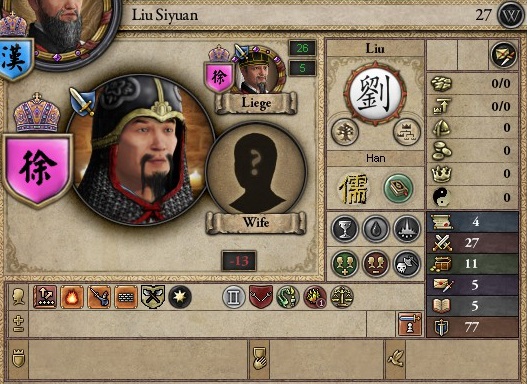









































































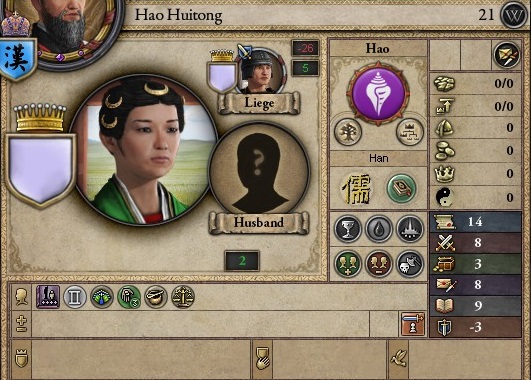




















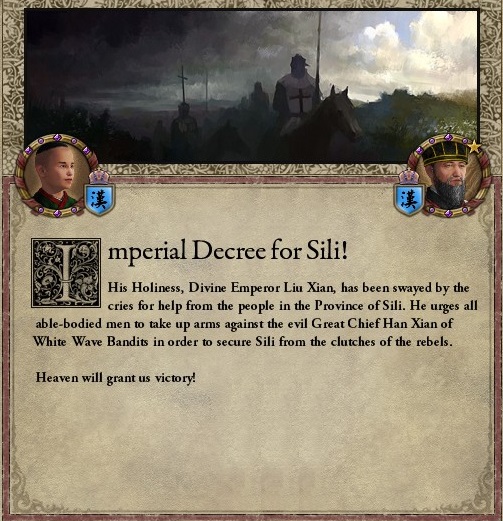



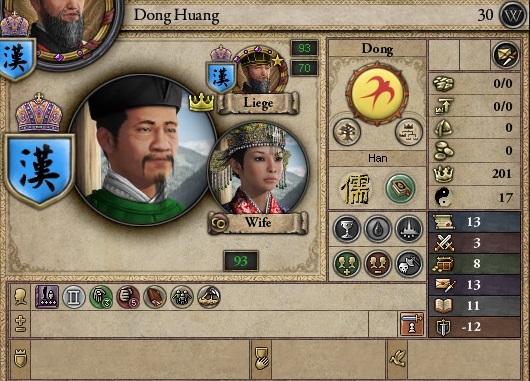

















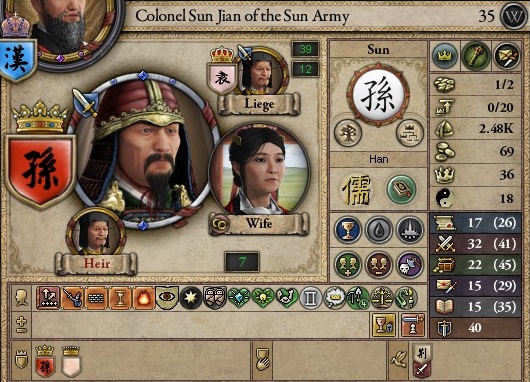















































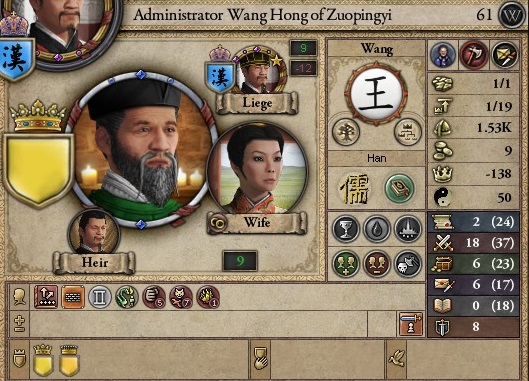


















































.jpg)
.jpg)

.jpg)



